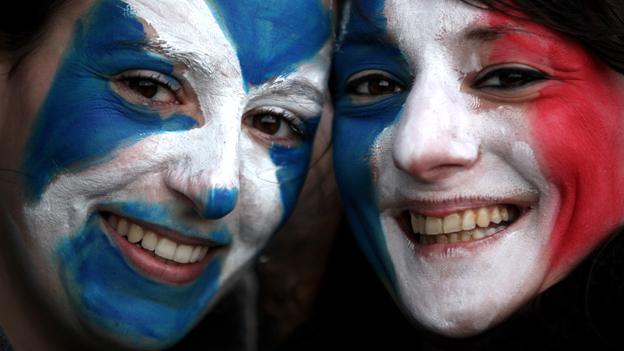French motoring schools driven to distraction
- Published
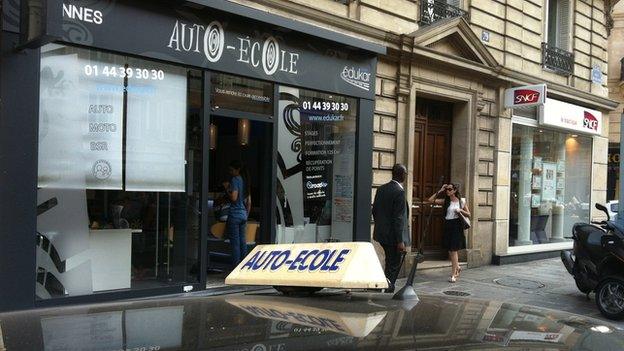
Young drivers can wait years to retake a test if they fail first time
At Ornikar's headquarters on Paris's trendy rue Oberkampf, they have taken care to install a functioning DVD player.
No one will ever use it. Nowadays everyone studies driving theory at home, online. But it is "regulations".
Regulations are proving the bane of Ornikar's founders, Alexandre Chartier and Benjamin Gaignault.
It is eight months since they applied for authorisation to operate as a driving school.
They think they have devised a model which would cut the cost of getting a licence by half.
But there are legal challenges, and the licensing authorities are dubious. So they are still waiting.
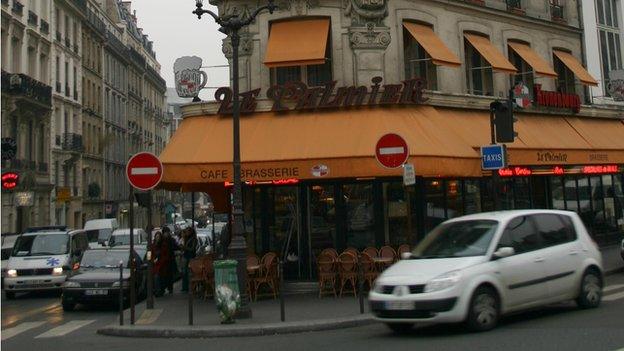
Ornikar's founders want to hire driving instructors who take bookings online
"It is extremely frustrating," says Mr Chartier. "We are renting these premises with no money coming in. In addition we have had to hire a lawyer to fight our case in the courts.
"The stress makes it very hard to focus on what we really want to be doing: which is improving the lives of people who want to take their driving tests."
System bypass
Everyone knows that the driving test system in France is banjaxed.
Young people pay up to 3,000 euros (£2,403; $3,900) to get through the process. If they fail at the first attempt, it can be months or years before they get a second go.
They are tied to a school system which is obsessed with keeping up the first-take success rate. As a result, less-gifted learners find themselves waiting interminably for an exam slot.
So laborious and costly is the process that it is reckoned several hundred thousand drivers in France have simply abandoned hope and are driving illegally - without a licence.
Ornikar represents the web economy's first shot at disrupting the established modus operandi.
Mr Chartier and Mr Gaignault want to do away completely with bricks and mortar. They want to hire a network of freelance instructors who will take bookings online.
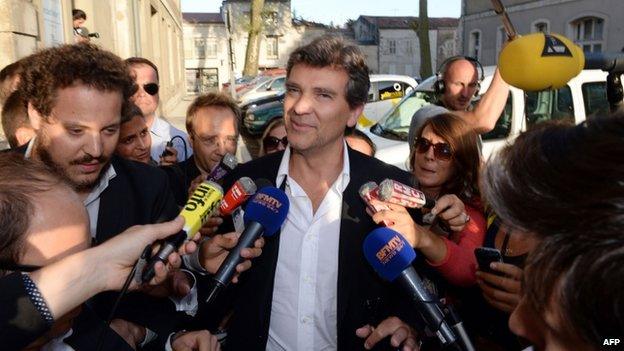
Before he left the government, Economy Minister Arnaud Montebourg promised to deregulate driving schools
Learners will have greater flexibility about where and when they take their lessons, and be able to rate instructors according to their teaching skills.
In addition, Ornikar wants to bypass the existing system under which learners apply for tests via the driving schools, which each have a set number of slots.
Instead it wants to encourage a little-used dispensation for "independent applicants" and promises to help with the paperwork.
Mr Chartier and Mr Gaignault have some well-endowed financial backers, so they can afford to keep waiting. They knew there would be opposition.
Publicly, it came in the form of a lawsuit from the National Union of Independent Driving Schools (UNIC).
The union, which represents school-owners, claimed that Ornikar was breaking regulations that have been in place for the past 30 years, and demanded that it be shut down.
In July, the courts found in favour of Ornikar, on the grounds that it could hardly be breaking regulations if it was not yet allowed to function.
'It's the examiners'
But UNIC's president, Philippe Colombani, remains extremely suspicious: "I have nothing against Ornikar per se.
"But regularly there are schools that try to set up without fulfilling all the necessary conditions - for example by not having handicapped access.
"Why should they be refused permission to operate, and then Ornikar be given approval?"
According to Mr Colombani, Ornikar's founders are playing a skilful media game, making sure they are portrayed as the victims of a backward-looking establishment.
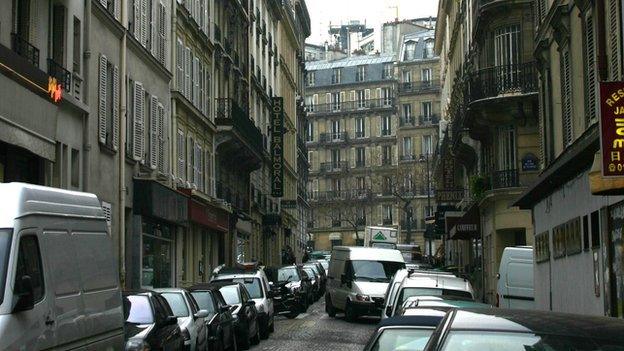
Red tape burdens many French professions including pharmacists, bakers and opticians
"In fact their 'disruption' of the system isn't that disruptive at all. In schools across the country, we do theory lessons online now. And their 1,000 euro [£800; $1,300] package is no cheaper than what we can offer too.
"When you look hard, the only people who will benefit from Ornikar are... Ornikar. They are the ones who will cream off their percentage.
"Learners won't notice much difference, and the real losers will be the instructors who as freelancers will end up in very precarious conditions."
Mr Colombani argues that the real villains in the system are not the independent driving schools but the state-paid driving-examiners.
"The blockage in the system is that there are not enough tests and that is because there are not enough examiners," he says.
"They are typical public sector employees, unionised, believing everything must be done by the state, for free. The real answer would be to privatise the exam system, or else take on many more examiners. But that will never happen."
Customers vs conscripts?
Reformers in France see the driving-school example as a classic case of how entrenched monopolies come to dominate sectors of the economy, to the detriment of the greater good.
Gaspard Koenig, who heads the free-market think-tank Generation Libre, failed his test in France five times, and then passed it in the UK. He says the contrast could not have been starker: "In France, the driving schools treat you like a conscript in the army.
"In the UK, they treat you like a customer. The whole story speaks volumes about France and its failure to take on its special interests. There are other lobbies too: taxi-drivers, pharmacists, opticians, bakers, newspapers, legal clerks.
"Throughout history there have been calls for successive governments to take on these regulated professions. But they never do."
- Published8 April 2013
- Published17 February 2012
- Published26 March 2013
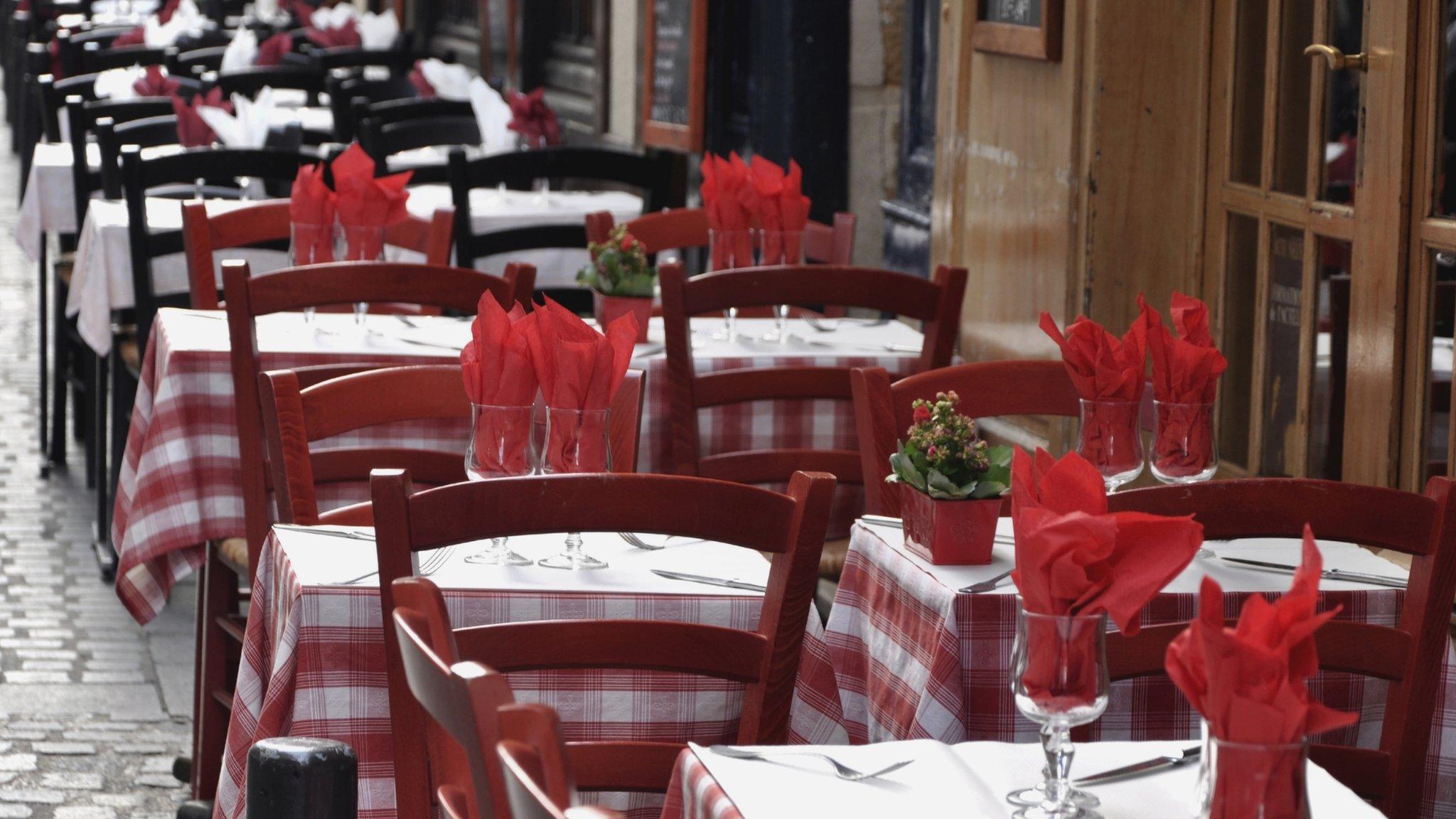
- Published18 August 2014
